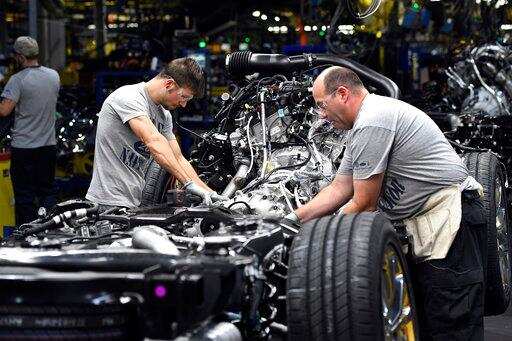
By Maria Sheahan
FRANKFURT, – Powerful German union IG Metall said it would step up industrial action ahead of a round of negotiations with employers as it pushes for higher wages and the right to shorter hours for 3.9 million German workers.
“We have started with warning strikes and will widen them in the coming days,” IG Metall chief Joerg Hofmann told German daily Passauer Neue Presse in an interview published on Wednesday.
In the state of North Rhine-Westphalia alone, the industrial heartland of Germany, more than 20,000 workers at companies including industrial group Thyssenkrupp and automotive supplier Benteler have been called on to strike on Wednesday, according to a spokesman for IG Metall.
To the south in Bavaria, rallies are planned at firms including engineering group Siemens.
Around 80,000 German industrial workers have taken action since the start of last week in support of IG Metall’s wage claims, and further walkouts have been announced for Thursday.
With the economy in robust health and unemployment at record lows, the country’s biggest union is demanding an inflation-busting 6 percent pay hike this year.
It has also called for a right to reduce weekly hours to 28 from 35 and return to full-time employment after two years for shift workers and those who need to care for children or elderly relatives.
Employers have so far offered 2 percent plus a one-off 200 euro ($239) payment in the first quarter and have rejected demands for a shorter work week unless hours could be increased temporarily as well.
SOCIAL RESPONSIBILITY
Under the current proposal, companies would need to hire part-time workers to make up for those who cut their hours, the head of regional employers’ group Nordmetall said in an interview.
“Where am I supposed to find them when there’s a lack of skilled workers?” Nico Fickinger asked on German radio station NDR Info.
The union has meanwhile made it clear it is drawing a line in the sand regarding the right to shorter working hours, saying employers had a social responsibility to contribute to issues related to health and family.
Hofmann told Passauer Neue Presse that the additional cost to employers could be around 1 percent of overall wage costs.
Talks between unions and employers’ associations are set for Thursday in the southwestern state of Baden-Wuerttemberg, where Volkswagen’s Porsche, Mercedes-Benz maker Daimler and automotive suppliers including Bosch are based.
Next door in Bavaria, home to companies such premium carmaker BMW and truck maker MAN, negotiations will resume on Jan. 15, and to the north in North Rhine-Westphalia on Jan. 18.
($1 = 0.8377 euros)